Looking Radiantly Healthy After Her Cancer Treatment
90s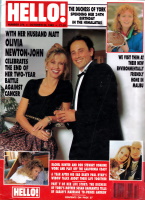
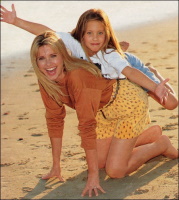
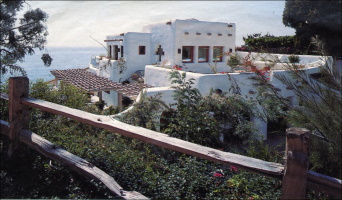
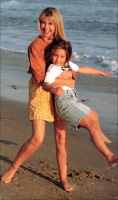
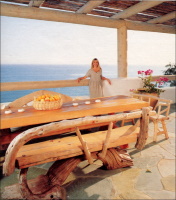
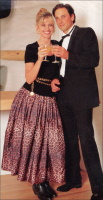
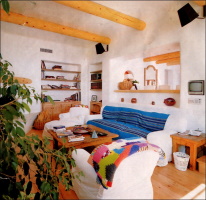
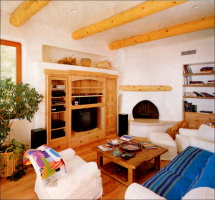
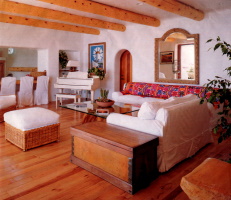
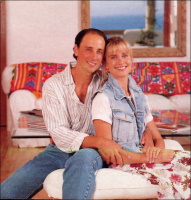
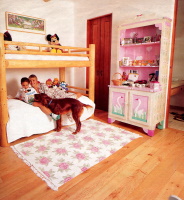
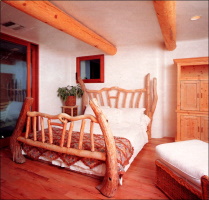
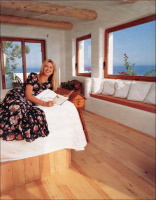
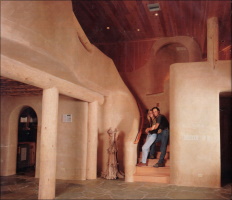
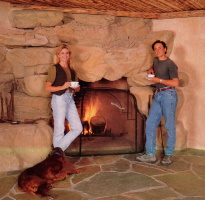
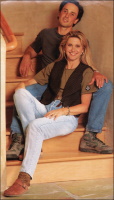
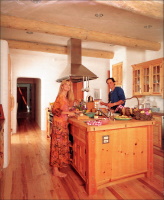
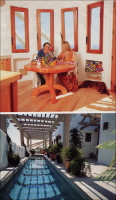
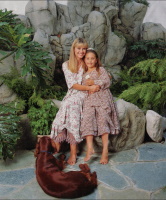
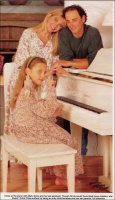
Ed- Hello is an oversized magazine and to fit it on the scanner back in the 90s we needed to scan the photos separately.
By Jose Antonio Olivar
When we last spoke to Olivia Newton-John, back in January of this year, she was still living at her mountain ranch in Malibu with husband Matt and their daughter Chloe Olivia had been operated on six months previously for breast cancer and was still undergoing treatment. Since then as Olivia herself says, there have been some big changes
. Most importantly, she has recovered from her life-threatening illness and is looking her usual radiant and youthful self. Both physically and mentally, Olivia's feeling great, especially after a few months in her beloved Australia.
Right from the beginning, she took a firm line with her own problem maintaining a positive attitude which has been vital in helping her through the ordeal, and which she hopes is an encouragement for other women facing the same thing. Nowadays Olivia finds she has more time for herself, and isn't afraid to take advantage of that after her hard-working career. That doesn't mean she's not active, of course: an ardent environmentalist, she's continuing her efforts to help find solutions to some of the world's problems. Her concern for the environment became particularly acute after the birth of Chloe in 1986, because she wanted the world to be a better place for when Chloe grew up.
And now she and Matt, who's an actor, have moved into their dream house, an environmentally-friendly mansion clinging to the rocks above the sea, but still in Malibu. The house means a fresh start after the trials of the past two years, and is exactly what they wanted throughout because Matt helped design and build it.
Olivia talked to us about her fears and triumphs, what she's been doing since we last spoke to her, and how she puts her philosophies to practical use so as to make life better for this and future generations.
Why did you move down from the mountains to the sea?
I have owned this piece of land for 12 years, and for ten years we talked about building a house but it took this long. But I think that because of everything I have gone through in the last couple of years, it was time for a change, and we felt this would be a nice fresh beginning for us. The house is very healing. It has lots of light; it's a very happy house. The sea is very soothing and there's lots of sun and fresh air.
What materials is the house built from?
The house is primarily plaster, wood and stone and the materials that we have used are environmentally friendly. We've used non-toxic paints and all the wood finishes are non-poisonous. The wood itself, for the doors and furniture, comes from forests that are harvested sustainably, i.e. they take one tree out of the forest instead of cutting down all the trees. We were very careful in what we used and we insulated it very well to save on heating and cooling, using seaweed insulating material. It stays pretty much the same temperature all the time.
There have been reports that it cost a lot to build, eight million dollars
I don't really like to discuss how much it cost to build. You should talk to my husband about that. It. was nowhere near that figure because we built it ourselves. If I had got a builder to do it, it may have cost that, but because my husband and his brother were the contractors, we were able to do it for much less.
But the value would be that'?
Yes, but it didn't cost us that.
How are you feeling now, both physically and mentally?
I feel wonderful. I'm physically strong; I finished all my treatment six months ago and then I went. to Australia for five months, living on my farm, eating avocados from the farm and leading a very normal life with Chloe. Matt was working two hours away and he would drive up at the weekends. I became much stronger there and since I've been back I feel even better. Mentally, which I think is a very large part of it, I feel the best I've ever felt.
Has your illness changed you?
I feel big changes. When you go through something that threatens your life, it. makes you put all your priorities in order. It makes you think about what is really important and what isn't, about who is important, what you want to do with your life and who you want to do it.with. You don't have as much time for the things that you don't care about. I want to do things that are fun and mean something to me.
Did you celebrate on the anniversary of the operation, July 14?
Let me think. What did we do? We were in Australia and I think Matt and I had a little toast to it and said, 'Here I am and I'm great and it's over'.
Have you had any moments of fear or depression since your operation?
Not after the operation, but before. I think when I first started the treatment I was a little afraid of having the first one because you don't know what's going to happen. Maybe you will be allergic to it, maybe you will drop dead. But after that I was fine. I felt very positive. Thinking positively is a very important factor in getting well.
A year ago, you said you were going to write a book about your experience. Have you started the book?
No, what I've done instead is write an album of my own songs. And I'm going to Australia to record them. But one day I will do that book.
Do you think women who've had the same problem will be encouraged by your experience?
Yes I do, judging by the mail I receive I think I've helped a lot of women who are going through it or have been through it, because they see someone who isn't afraid to speak about it. I've been on television to talk about it and the importance of the way you think and yes, I do think that I've helped other women. I will continue to do so; I'm going to make a video to help them as well.
Do you still have medical check-ups?
Every six months or so.
You have said in the past that there's a link between pollution and cancer. Is it possible to prove this?
I think the environment plays a major role in causing cancers, particularly in children. In fact, I'm very involved right now in the Colette Chuda Environment Fund. Colette was my daughter's best friend who died a few years ago and we have started a fund in her name. With money from that fund we are doing research into the connection between the toxins in the environment and cancer.
I also believe that the mind plays a role in disease. I think that if you have stress and worries that you don't deal with, then that in turn affects your immune system and you get sick. So, definitely there is a link between an environment of pollution and stress and cancer.
But most people live in big cities and don't have access to a pollution-free environment.
I'm very fortunate there, because I'm lucky enough to live where I can have all this. But I'm also in a position where I can fight to have legislation changed to help those people, so that eventually they will have fresh air. Everybody has the right to a clean environment, but we all have to fight the big companies and the government to change the laws in order to protect ourselves. Because of my position, I am able to get involved, and that's what I'm doing. I'm helping to raise money for studies to find out what causes these diseases, and then hopefully we'll get the legislation changed to protect everybody.
What kind of food do you eat?
I try to buy as much organic food as I can, in other words, food that hasn't been treated with sprays or pesticides, because it's healthier. At the moment it's also more expensive, but the more people ask for it, the more shops will get it, and eventually it'll be cheaper because the farmers will realise there is a market for it.
What do you value now that you didn't value before?
I think I value my own time more: I used to give all my time to others and now I find value in being by myself, having peaceful times with my family, or just sitting. And now I meditate every day, twice a day. I do yoga when I can. I take time for myself. My values haven't changed; I still know what is important, but I have more time for me.
Last year you said that living was more important to you than working. Is that still true?
Yes, my time in Australia was one of the best times of my life. I was just being a mother, doing the cooking, washing, cleaning and shopping. It was great. A normal life.
But to have a good life, don't you feel you have to work?
I've worked my whole life, I'm allowed to have a vacation after I've been sick. I am working now, I'm writing music and working for the environment.
Have you performed any of your songs this year?
Not this year. I've been writing my music. I took time off; I needed to.
What is a typical day for you?
One day is never the same as the next. Life keeps changing every day. The only thing that stays the same is that Chloe has to go to school, so we get up in the morning together and have a quiet breakfast, then Matt or I drive her to school. I usually get up at six. When the sun comes up, I get up and meditate. Then I come downstairs and have my hot water and lemon before the family gets up, and I make my phone calls to Australia, then we all have breakfast together. After Chloe's gone to school, Matt and I will sometimes take a walk on the beach. I will do business with my secretary and a bit of shopping, then I pick Chloe up from school.
What else have you been doing?
I wrote the book for children, but more important than all that, I've just been a human being, which is more important than anything else. And I helped my friends in Australia who had an environmental problem. Because of my name, I can get attention on environmental problems, so I got very involved with that.
Tell us about the book that you have written, and why did you call it A Pig Tail?
I did it with a friend of mine; it started out with me telling jokes about pigs, I like pigs, When you call someone a pig, it's supposed to be bad, but I know pigs are very intelligent, so I was making jokes about them. It turned into a children's book about pigs that recycle. It's on recycled paper and it's for children from about three to nine. My portion of the money from the book is going to the Colette Chuda Environment Fund, and my friend who wrote it is giving his proceeds to AIDS.
Have you got any ideas for another story?
Yes, we've already written the next idea. We have the outline for that one, and we know what the one after it will be.
Would you like to return to the public eye and the pop charts?
The music I want to make now is music from my heart and I'm not thinking about it being a hit, I just want to make the best music that I can. I'm not even thinking about the pop charts at the moment.
And films?
I made a television movie two or three years ago, and Matt made a TV series called Paradise Beach in Australia. That's why we went to Australia. He played an American photographer.
Matt, can you tell us how you felt about the series which you did?
I did a soap opera for six months. It was a good experience for an actor because you had to do a show a day, and I was used to film, where you have plenty of time. I enjoyed being in Australia very much, and it's good that I got residency there, so I can go back again to work. But I don't think I'll do a soap again. It's not my kind of role. I think any soap opera is limited because of the rehearsal time, and usually the subject matter isn't to my taste. I played a photographer, which was a good character. I would have liked to have seen the material a bit more up with the times, dealing with some pertinent matters rather than some of the nonsensical themes, but it was okay.
A lot of men don't like being less famous than their wives. How come you can handle it?
I guess I had a stable childhood and I was already aware of what I could do before I met Olivia. My career was important, but it didn't matter that my wife had a much more established career because I recognised that her talent is far above that of anybody I'm competing with or anybody who's out there, as far as I'm concerned. So I don't try to compete with something like that.
What did you learn from Olivia during the difficult moments?
The power of positive thinking.
What is the secret of your happy marriage, Matt?
Communication and work. Any relationship takes work. If you want it to work, then you work at it. If you feel it's not worth the trouble it takes to stay in a marriage...
Olivia, how did Matt help you through the hard times?
We're people. He's my husband and I'm his wife and you help each other through all the problems. Popularity doesn't have anything to do with how strong you are as people or how your relationship is: we're equals, and he's a wonderful husband to me, very supportive and loving. I was very lucky to have him.
And how about Chloe? What does she want to do when she grows up?
Olivia: It changes all the time. She's only seven. One day she wants to work in the rainforest and the next she wants to be a nurse or a teacher and so it goes on.
How about acting?
Olivia: She's got the gift but I don't know if she wants to be an actress. Whatever makes her happy.
Who's stricter with her?
Matt: It depends. I'm very strict, but it balances out.
And who does she take after?
Matt: She has Olivia's sense of humour and her love for animals, and she's an 'artiste' she has a flair for mime. Then she's got my dexterity, love for life, my skin and physical features, my temper...
Olivia, what nationality do you feel you are?
I'm a person who lives on the planet; I like all parts of the planet. I love Australia, I love America, I love Europe. I love many places. I love the world.
And finally, how would you encourage other women facing what you had to?
First, I would tell them to find a support group so they don't feel alone. Find time for things like meditation and yoga. I had acupuncture, I saw homeopathic doctors. I used Eastern, as well as Western, medicine. To keep my body pure, I was very careful with my diet. I read a lot of books. And above all, I'd tell people to keep focusing on that positive thought, that you're going to be okay. You've got to have that focus.